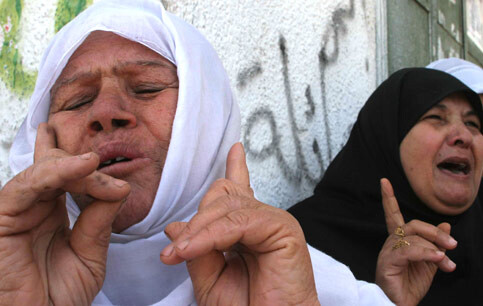The Electronic Intifada 18 May 2007

Palestinians attend the funeral of four Hamas militants in Gaza. Three of the militants were killed yesterday after an Israeli aircraft launched a missile at a training ground for Hamas’ Executive Forces in Rafah. The fourth was killed yesterday during clashes between Hamas and Fatah militants. 17 May 2007 (Hatem Omar/MaanImages)
JERUSALEM, 17 May 2007 (IRIN) - Humanitarian aid agencies are expressing concern as renewed intense Palestinian infighting between the Fatah and Hamas factions enters its fifth day, during which nearly as many ceasefires have been broken, and over 40 Palestinians killed.
Two Israeli air strikes on Thursday in central Gaza City have left at least three Palestinians dead, and injured 30 more, including civilians, as Israel steps up its retaliatory actions against Hamas militants in the Gaza Strip. Another Israeli strike hit the northern Jabalya refugee camp, and Israeli tanks have entered the strip for the first such incursion in about six months.
The Israeli military has said its latest air strikes, three on Thursday and two Wednesday which have altogether caused eight deaths, are meant to “ensure the security and safety of all the citizens of Israel.”
Several dozen homemade rockets have been fired from the Gaza Strip into southern Israel, particularly on the town of Sderot, causing damage to homes and other buildings, and several people were injured. Israeli Foreign Minister Tzipi Livni has called the situation “intolerable.”
As Israel promises more retaliation for rocket attacks, Palestinians are concerned that the military may launch a wider operation, and remain extremely worried that the internal violence will not stop.
Internal firefights
Earlier on Thursday, a Palestinian militant was killed by rivals, raising to four the number of people killed in internal firefights since the latest ceasefire was reached less than 24 hours earlier.
A health worker from the Palestinian Medical Relief Society was injured while on a mobile clinic in the northern Gaza Strip on Wednesday morning. The group says “despair and lawlessness are growing, leading to a situation where work is becoming extremely difficult, even for emergency humanitarian organizations.”
Reports have also indicated that militants were stopping ambulances at makeshift checkpoints set up in various areas.
Karni Crossing closed
According to an aid worker in the Gaza Strip, “No humanitarian aid is coming into Gaza now, because Karni Crossing has been closed since Tuesday” when Hamas forces staged an attack on a Fatah-affiliated base at the crossing, which is the central commercial crossing into the Gaza Strip.
The crossing has been closed on the instructions of the Palestinian authorities.
Meanwhile, small amounts of medical aid, including blood supplies, are being sent in to Gaza from Palestinian sources in the West Bank with the help of the Israeli military’s coordination units, which also facilitate the fuel supply into Gaza, said Shlomo Dror, a spokesman at the Israeli Ministry of Defense.
“We want to prevent a situation where there will be a shortage of food or medical aid,” he added.
The internal violence has caused people to stay off the streets at times this week, for fear of being hit by stray bullets or mistakenly targeted by gunmen. On Thursday some shops reopened, but many residents of Gaza City remained in their own neighbourhoods, afraid to travel through the centre, which has been a hotspot for violence.
Aid workers keep low profile
Even many local aid workers inside Gaza have not gone to work over the past few days, and preferred the relative safety of staying inside. Some of the already limited international staff from aid groups and UN agencies have refrained from working in Gaza this week, because of concerns of kidnapping and getting caught in the sometimes indiscriminate crossfire.
Electricity shortages
In addition, there remain shortages in electricity and rubbish collection has ceased.
The electricity supply has been unstable since an Israeli air strike last summer on the main power plant in the Gaza Strip. The UN’s Office for the Coordination of Humanitarian Affairs (OCHA) expressed concern earlier this week that “Most Gaza residents will suffer disruption to their lives as result of the [power] cuts” expected in the upcoming weeks during peak summer demand.
Furthermore, the infighting has caused damage to some transformers, and in one case fuel tankers were unable to reach power stations in certain southern sections of the strip.
Health concerns
OCHA has also said that municipal workers are unable to move around in the streets, which are now “populated by masked gunman.” The organization warned that “public health concerns may grow” if the violence continues, particularly as the summer temperatures continue to rise as the rubbish piles up on the streets.
Palestinian civil society groups have condemned the violence, with the Gaza Community Mental Health Programme warning of its “impact on the mental health of all Palestinians.”
The group says the repercussions include a rise in “people’s anger, worries, frustration, fear, and feelings of insecurity… threatening the social fabric and structure of the whole Palestinian community.”
This item comes to you via IRIN, a UN humanitarian news and information service, but may not necessarily reflect the views of the United Nations or its agencies. All IRIN material may be reposted or reprinted free-of-charge; refer to the copyright page for conditions of use. IRIN is a project of the UN Office for the Coordination of Humanitarian Affairs.
Related Links


